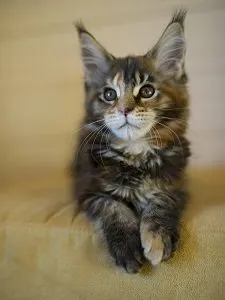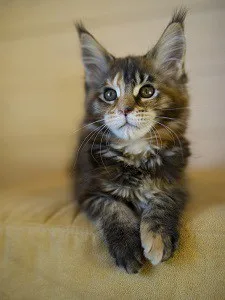 Cats come in all different shapes and sizes, along with a variety of personality traits. If you’re researching new pet possibilities or simply came across this unique breed, you may be feeling wary of the Maine Coon’s size and wild appearance. You might be wondering, are Maine Coon cats friendly?
Cats come in all different shapes and sizes, along with a variety of personality traits. If you’re researching new pet possibilities or simply came across this unique breed, you may be feeling wary of the Maine Coon’s size and wild appearance. You might be wondering, are Maine Coon cats friendly?
Maine Coon cats are friendly. They are also mild-mannered, affectionate, and a popular choice of pet.
Maine Coons are believed to originate from the state bearing the same name, even going so far as to be proclaimed the state cat of Maine in 1985. One of the largest domesticated breeds of cat, they can weigh anywhere from 9-18 lbs and stretch to 40 inches long. If you’re curious about the ins and outs of the great Maine Coon, we’ve got you covered! Keep reading to find out if this breed is right for you.
What Is The Temperament Of A Maine Coon Cat
Despite their intimidating size and ferocious fur, these cats have been nicknamed “gentle giants” and are praised across the board for their calm demeanor.
They are known to carry themselves with dignity and are quite intelligent. Combining their patient nature with a sharp mind, Maine Coons can be easily trained to follow simple commands.
These oversized felines even like to play fetch and can be taught to walk on a leash! For this reason, they are sometimes called the “dogs of the cat world.”
Are Maine Coons Good Pets
Maine Coons are reported to be loyal and loving and can generally find their place peacefully in any family situation. They are curious and playful, yet their cool composure keeps them from getting too overexcited.
This balance allows the Maine Coon to fit in virtually any household, whether it be among older folk who prefer a quieter lifestyle or a bustling family with young children.
Although most longhaired pets require a copious amount of maintenance, the Maine Coon, surprisingly, is less demanding. Giving their coats an occasional brush is all that’s necessary to keep their fur mat-free and glossy.
Because of their size, it’s essential to afford this muscular animal ample room for exercise. A large home or fenced-in yard can do the trick. They are also great at catching rodents, which is always a plus!
One thing to be aware of is the Maine Coon’s potential for specific health problems. While many breeders have taken steps to weed out these issues genetically, it’s always good to do your research and consult with a vet.
Do Maine Coons Get Along With Other Cats
Maine Coons also make good pets for their tendency to get along well with other pets, not just their humans. Generally speaking, a Maine Coon will do well when introduced either as a new pet or in meeting a new family member.
It’s crucial to find out from the breeder whether your cat in question has been socialized. As with any breed, spending time with other animals helps a pet acclimate to others’ presence and learn to tolerate and even enjoy it.
Cats kept in isolation might be less enthusiastic about meeting new friends, having been deprived of the chance to exercise those social skills.
If you’re concerned about introducing your Maine Coon to other cats, try for a gradual approach. Separate the cats from each other first through a door, then through a baby gate, and then perhaps on a leash.
This will allow the felines to get a whiff of each other and express their opinions. Take cues from their body language as to how to proceed.
Are Maine Coon Cats Aggressive
Maine Coons are not naturally aggressive, but like any animal, they can be driven to unwanted behavior due to external or internal conflict.
Some causes for Maine Coon aggression could be health problems, moving homes, receiving less affection due to the arrival of a new pet, or sensing tension among its human family members.
Talk to your vet if your new or established pet is exhibiting antisocial behavior.
Are Maine Coon Cats Cuddly
Now we know that Maine Coons are apt to display pretty consistent pleasant behavior. But are they cuddly?
On the whole, Maine Coons are friendly, cuddly, affectionate cats. They like to be held and to snuggle up next to their favorite human.
As with any pet, there is usually a range of desire for connection. Some Maine Coon owners describe the breed as generally amiable, though not necessarily lap cats, while others maintain that theirs is the cuddliest bundle of fur they’ve ever come across.
Personality and experience can affect each Maine Coon’s disposition, though the overarching opinion remains that they are, hands down, their owners’ best buddies.
How Do Maine Coons Show Affection
Maine Coons display their love for you in several heart-melting ways. They might follow you from room to room as you go about your day, just wanting to be in your presence.
They will rub their heads and bodies on whatever part of you they can reach. If you settle down in your favorite chair, don’t be surprised if you acquire a fluffy seatmate soon after, purring its brains out.
Maine Coons are quite social and will use their power of vocalization to carry on a “conversation” with their humans. As opposed to the standard sounds that most cats are known for, these muscular beauties possess their own unique noises.
Rarely emitting a long meow, Maine Coons tend to make incredibly endearing trilling, cheeping and chirping sounds. As you get to know your furry friend, you will learn to recognize the intentions behind each vocalization.
Note the urgency level in your cat’s tone to determine if this is a pleasant sound or if your feline might be trying to let you know something’s amiss.
What If My Maine Coon Is Not Affectionate
Wondering if your love is mutual? It’s essential to take a look at your definition of “affectionate” to determine if your cat is falling short.
While some cats won’t stop loving on you until you’re wearing most of their fur, others will show their fondness in subtler ways. They may purr, close their eyes, knead, or bring you presents (ew).
There are things you can do to encourage more affectionate behavior from your Maine Coon. If you receive your cat as a kitten, you can acclimate them to your touch early on. Hold them, pet them, bring them close to you for cuddles.
For older cats, a slow and steady approach is best. Support your cat’s comfort by giving him or her the space to explore and plenty of hiding places. Make sure the food, water, and litter box are in plain sight.
Talk to your Maine Coon in a calm, soothing voice and see if it responds by closing its eyes or waving its tail. Offer treats and move them gradually closer to you, without making any sudden movements. Allow your cat to sniff you once it’s comfortable nearby and try a few experimental pats.
Hopefully, with a lot of patience and love, your Maine Coon will learn to enjoy your affection and show you some in return.
Tips To Bond With Your Cat
You might be a great person, but find yourself wondering how to become besties with the fuzzy loaf that shares your couch. Here are a few tips to help you bond with your cat:
● Talk to him/her. As mentioned previously, you can bond with your cat without even standing in petting range. Your cat will get used to your voice and may even start to answer you back!
● Offer treats. In moderation, occasional treats can help your cat associate you with something positive.
● Try petting during meals. The filling of bellies puts most people and pets in a good mood. Once your cat has learned to expect regular, satisfying meals, it will link this experience to feeling safe in your home. S/he might be more open to being pet in this content state.
● Establish a routine. Everyone benefits from knowing what to expect, and cats are no different. Setting up consistent mealtimes, treats, betimes, and other parts of your day will help your cat learn the flow.
● Be consistent with your ground rules. One thing that is guaranteed NOT to help you form a bond with your cat is to be inconsistent about what you allow him or her to do in your house. Decide what’s ok or not and stick with it.
● Brush him/her. You’ll accomplish two things when you brush your cat. Not only will you strengthen your bond by giving your cat a brush massage, but you’ll also remove loose hairs that can cause hairballs and prevent your cat’s fur from becoming matted. It’s a win-win!
● Play! Cats are feisty, playful creatures. When cats play, they exercise their strength and dominance in addition to their muscles.

My name is James, and welcome to FAQCats!
Along with our team of cat owners, expert pet enthusiasts, and pet professionals, we aim to write engaging helpful, engaging content about cats. At FAQCats we strive to provide content that’s accurate and fun to read. Our team writes about everything related to cats; even the most complex of topics. Through extensive research and caring for our own fur-pals, we’re able to provide something cat owners worldwide will love. Have a look around, and leave us feedback anytime!

